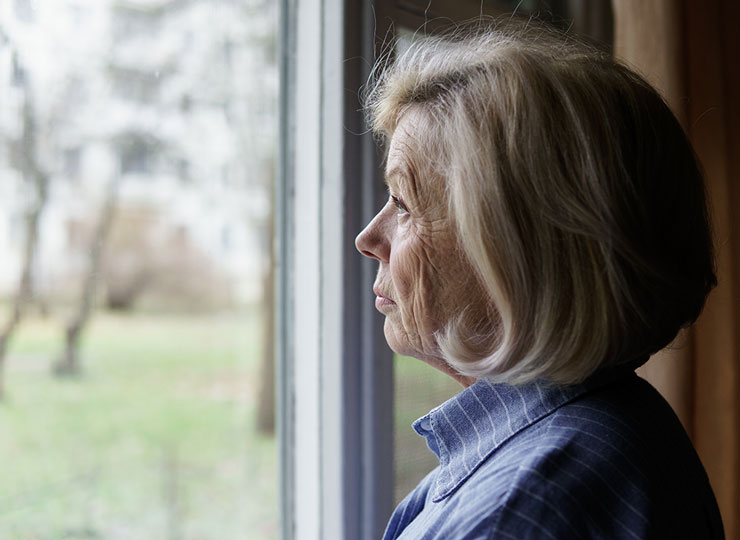
April 28, 2020
In this time of social distancing and coronavirus, a growing number of people find themselves isolated, lacking social interaction and companionship. The National Academies of Sciences, Engineering and Medicine reports that social isolation in general (not related to Covid-19) has been linked to a 50 percent increased risk of Alzheimer’s disease and other forms of dementia, as well as an increased risk of heart disease and stroke.
A recent study of widows and widowers underscores the potentially harmful consequences of social isolation on brain health over a period of four years. It found that older men and women who lost a spouse were at increased risk of cognitive decline. Declines in memory and thinking skills were particularly prominent in those at greater risk of developing Alzheimer’s disease, the study found.
For the study, researchers at Brigham and Women’s Hospital in Boston looked at 260 men and women, aged 62 to 89, who were enrolled in the Harvard Aging Brain Study. All had normal thinking and memory skills and no signs of dementia.
The researchers knew the study participants’ marital status: married, single or widowed. Using PET scans, they also measured brain levels of beta-amyloid, the toxic protein that clumps together to form the telltale brain plaques of Alzheimer’s disease.
Over the next four years, participants underwent regular tests of thinking and memory skills. The researchers found that cognitive performance declined far faster in the widowed group than in the married group. There was no difference between the married group and the unmarried group, perhaps because those who were used to being on their own were not affected by a traumatic loss.
In addition, they found that among adults with the highest beta-amyloid levels, who would be at highest risk for Alzheimer’s disease, those who were widowed declined at a rate three times faster than the married group, even after controlling for factors like age, sex, socioeconomic status and depression.
“We know that social relationships can be an important buffer against cognitive decline,” said senior author Dr. Nancy Donovan, of the Division of Geriatric Psychiatry at Brigham. “Being married provides opportunity for more social engagement and emotional support from a spouse, it expands one’s social network, and it provides more opportunity for cognitive stimulation. All of these benefits are lost in widowhood. Importantly, loss of a spouse is a highly stressful life event which can have deleterious effects on the brain.”
“Our findings also suggest that researchers engaged in Alzheimer’s disease prevention trials may want to pay particular attention to widowed older adults to tailor interventions for this especially susceptible group of patients,” Dr. Donovan added.
Experts say that we all can take measures during this difficult time to counter the negative consequences of social isolation. Among their recommendations:
*Reach out to friends and neighbors and ask how they’re doing. Helping others, even if it’s a small gesture, can be incredibly powerful and rewarding and a good reminder of purpose.
*Pick up the phone and give someone a call. Hearing someone’s voice offers a level of closeness that you can’t get with texts or emails.
*Try to focus on the here and now, whether it’s the beauty of new blooms in the garden or the sound of birds in the morning. Focusing on the present moment can be a good balm for combatting anxiety and stress.
*Many tools, like Zoom and Facetime, are now available for videoconferencing with friends and family members. Reach out. A short five-minute check-in, free of other distractions, can be rewarding for everyone involved.
By ALZinfo.org, The Alzheimer’s Information Site. Reviewed by Marc Flajolet, Ph.D., Fisher Center for Alzheimer’s Research Foundation at The Rockefeller University.
Source: Biddle, Kelsey et al. “Associations of Widowhood and ß-Amyloid With Cognitive Decline in Cognitively Unimpaired Older Adults” JAMA Network Open, Feb, 2020.











